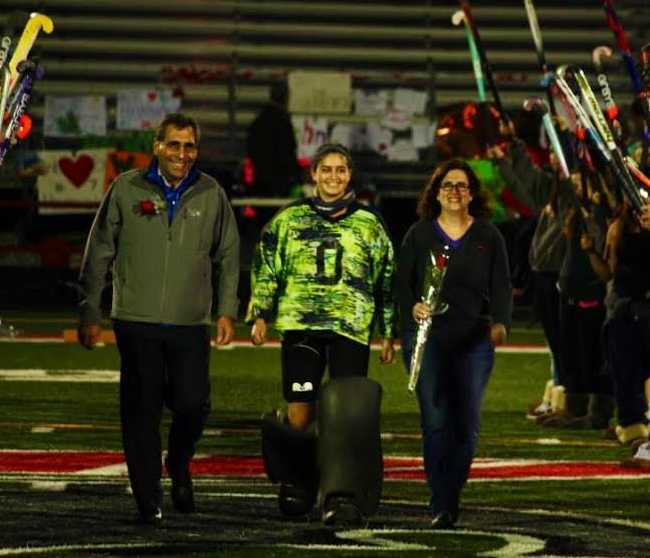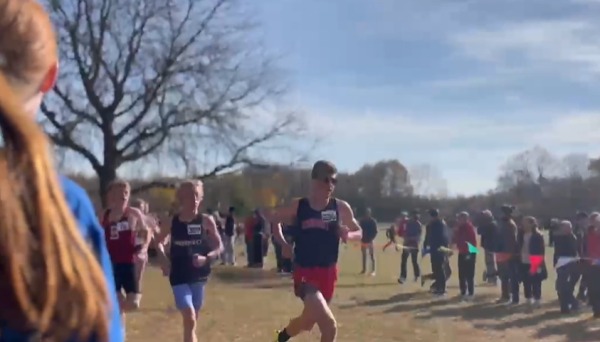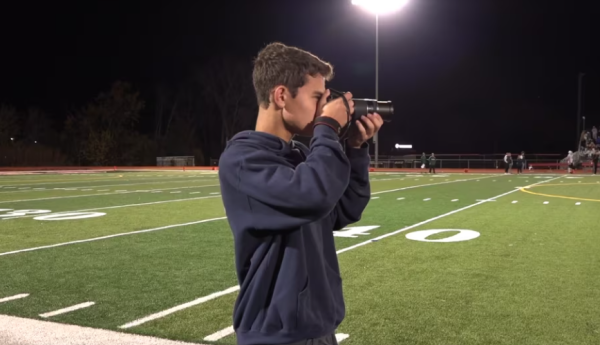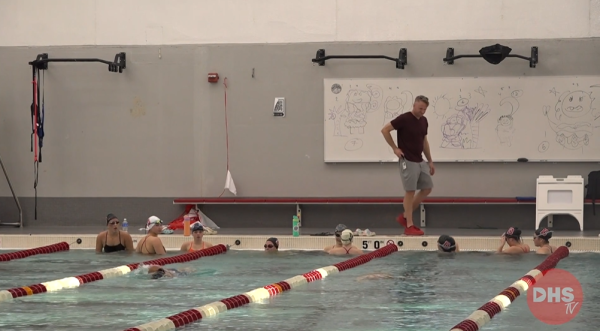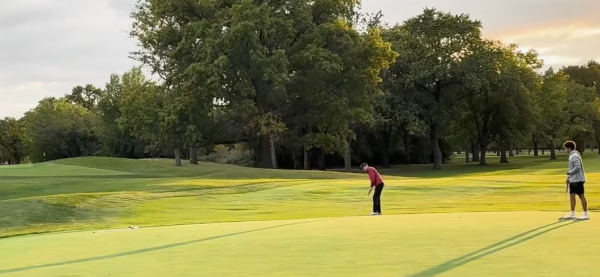Stick with it: Training after season and reaching collegiate goals
GREATEST SHOW ON TURF: After four years on the team and two years on varsity, Cohen is celebrated by her teammates alongside her parents as they participate in the senior night tradition during their last home game. The event culminated in the final win that Cohen would achieve as a member of DHS field hockey.
With the weather cooling down and the fall sports season coming to a close, many DHS athletes stow away their sticks, balls and spikes for the year. But for seniors Spencer Sachs and Talia Cohen, the off-season marks the beginning of an intense training regimen to prepare for the next volleyball and field hockey seasons, respectively.
“When it is not the school season, I am playing club all year round. It is actually starting in just a few weeks. This is all I do now, I don’t ever want to stop,” Cohen explained.
Both seniors began their sport with no intention of pursuing it as a passion. Cohen tried out for the field hockey team without any knowledge of the sport. As a freshman, she thought it would be a great way to meet new people at DHS. Similarly, Sachs initially became interested in volleyball when he started playing in seventh grade and decided to try out with his friends.
“My friends in middle school were trying out for the team and I was like okay, why not give it a go? So I tried out, I made the team and fell in love. From then on I’ve just been climbing ever since,” Sachs said.
After playing one season of each of their sports at DHS, both athletes decided to take their training to new levels and join a club team. Enrollment in club sports is competitive; athletes are only accepted onto the team after a tryout process designed to test their skills and abilities.
Joining club changed both of these athletes’ lives. Their schedules now revolve around their training. Sachs and Cohen spend two nights a week during the off season practicing with their team. They also play in tournaments across the country on weekends and work out on off days to continue to improve their game.
“Sports has never been something that has given me stress or felt like something added on, but it is an outlet for me. It also helps me budget my time, since I know I won’t be home until around six or seven I have learned to squeeze my work in,” Cohen said.
The key difference between club season and school season, as described by both athletes, is the intensity and pace of the programs. The coaching also differs, as Sachs describes that the DHS season is more relaxed and focused on the entire team rather than the individual’s position.
“My club coach is screaming, yelling and fired up. He is pushing us to our limits and beyond that, so at the end of practice he wants us to be so exhausted that we fail, meaning that we physically fail, we can’t take another step,” Sachs said.
Not only do the programs and coaching outside of school differ, but the team dynamic is different as well. Sachs explained that both teams have great chemistry, and Cohen echoed his sentiment, describing the experience of initially not knowing anyone on her club team but quickly bonding with her teammates through shared experiences.
“Even when we play each other’s high schools, we all say ‘Hi’ and joke around with each other, so yes, we are very close. That’s what makes the sport so great, it’s the people and the friendships that I have made from being on the team,” Cohen said.
The dedication necessary to pursue club athletics in high school pays off. Many club players go on to play on collegiate levels. Since day one, this has been Sach’s dream, and after almost four years playing club, it is now reality. It started at the beginning of his junior year, when Sachs played for a UCLA volleyball program and met the coach.
“So he [the coach] has seen me play, he has come to the national tournaments, I have sent him videos, and he finally said, ‘Alright, we want to fly you out here and meet with you.’ So this will be the first official visit I am going on. They are paying for my flight and for the entire visit, for food, everything,” Sachs said.
Sachs is now committed to play volleyball for UCLA and credits his accomplishment to his hard work both inside and outside of school. Cohen’s future plans are a bit different. While she wants to continue playing for the rest of her life, her academic plans do not revolve around a strong field hockey program.
“I don’t want to make my decision based off of [field hockey] because at the end of the day, there is no professional league. I don’t want to come out of college from some not-great university just because I wanted to play. I will probably play at the club level wherever I go, I really don’t want to stop playing now,” Cohen said.
The success of a club athlete is ultimately determined by the athlete’s devotion to the sport and the coaching that shapes her skills and attitudes. Windy City field hockey coach Katie Beach is known for her experiences on national and Olympic teams. After playing at Maryland University and coaching for Virginia University, she now focuses on honing the skills of high school athletes and enabling them to reach their goals.
“Coach Beach and club have been incredibly beneficial for me, mostly because of her experience and playing with girls who picked up their first field hockey stick back in elementary school. She really spends time with me and in practice, I just take shot after shot, it has been key in improving my game,” Cohen explained.
Sachs and Cohen are just a few months away from embarking on the path which culminates all their academic and athletic work over the past four years.
“Especially when the school that was already my number one choice could now offer me the opportunity to play and get better, that is just icing on the cake,” Sachs said.

Now in her third year as a writer for Deerprints, Lizzie is excited to continue her work on the paper. What excites her most about the Deerprints in particular...

